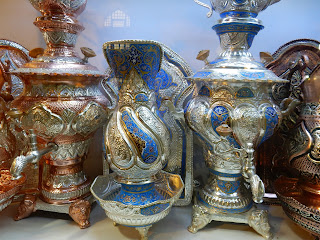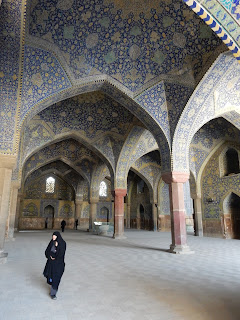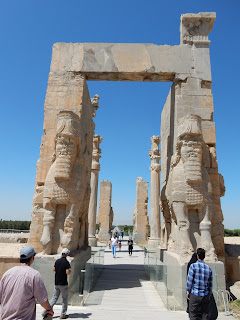Contributed by: Andrew Melzer

Mention a holiday to Iran and most people will probably
respond with something like "but it's dangerous there!". That was
certainly the response I got from most of my friends and family when I
told them I wanted to go. This preconception has been pushed rather
heavily by the Western media, showing Iran as a dangerous place rife
with threats from terrorism and a government paranoid of the West.
It is at this point that you should forget all that you
think you know of Iran, as the reality is very different. As a tourist
you will feel safer than in many other more touristic destinations.
Those travellers daring enough will be richly rewarded with a multitude
of sights and experiences, and a variety to suit most tastes. All of
this within a very affordable budget. Perhaps best of all, for a country
so rich in attractions and activities, you will be amazed at how few
other tourists there are. I traveled for two weeks through the north of
the country and did not see another foreign tourist until I reached
Tehran.
Getting there
Probably the hardest part of traveling to Iran is the visa process.
There are two types of tourism visa: 15 day visa on arrival at airports
(risky because it is not pre-approved) and the 30 day visa obtained
prior to entry. Most nationalities require approval from the Iranian
Ministry of Foreign Affairs (MFA) in Tehran before processing your
application. Arguably, the easiest and most reliable way to get a visa
is through one of the various online visa services, which tend to be
somewhat light-on with the 'service' part. Tip: before you start the
process, make sure you have a working PayPal account that is ready to
use. For a fee the service will obtain an authorisation code from the
MFA on your behalf, which you then take to your nominated Iranian
consulate to get your visa. At the consulate you fill out the
application form, pay the fee and get the visa. The fee varies depending
on your nationality and how much the official on that day feels like
charging you.
Who can go?
Practically all nationalities are eligible for Iranian visas except
citizens of Israel or anyone with an Israeli stamp in their passport.
American citizens are eligible but must be part of a guided tour or have
a private guide.
History
One of the best reasons to visit Iran is the incredible wealth of
history the country holds; with some archaeological sites, like the 7000
year old town of Soltaniyeh in the North, amongst the oldest in the
world. As the centre of the former Persian empire, the country also
boasts a number of impressive Persian ruins, such as the ancient capitol
Persepolis and the tombs of the Achaemenian Kings at Naqsht-e-Rastom.
The best part is that as a budget traveller, these sites are well within
reach; the usual cost of entry for foreigners is around 120,000 rial
(~4 USD) and there is practically no wait to get into any of these
places.
Landscape
There is so much more to Iran than just the desert that everyone
imagines. Of course there are the deserts, but there are also forests
and jungles in the north, temperate areas in the west, beautiful
coastline in the south and stunning mountains everywhere in between.
Most of Iran's mountains run from the south up the Persian Gulf towards
Turkey, providing some excellent hiking if you can manage transport to
these difficult areas.

The people
In my opinion (and that of many other travellers I met) the people are
the best part of a visit to Iran. They are incredibly friendly and
hospitable, trustworthy and helpful. It is very common for locals to
approach you on the street to start a conversation, not because they
want to sell you something, but because they genuinely want to talk to a
foreigner. If hotels aren't your thing, Couchsurfing is also an
incredibly easy way to find friends and accommodation, with just one
public request yielding dozens of offers from locals keen to meet a
foreigner and practice their English. Indeed, probably the biggest
difficulty you'll face once in the country will be turning down all of
the offers of assistance and hospitality. The shopkeepers and taxi
drivers will also generally give you a fair price (at least compared to
other countries in the region).
Transport
For independent travellers on a budget, the cheapest form of transport
is buses (thanks to oil and labour being so cheap in Iran). A six hour
'VIP' bus (normally with lots of leg and elbow room) will cost around
240,000 IR (~8 USD). For the places that buses won't go, taxis will take
you for reasonable prices. Iran is also one of the safest and easiest
places to hitchhike, but as with all countries, care should be taken if
you are going to hitch.
Favorite places
Despite tourism being in its infancy, there is something of a tourist
trail from Tehran south to Shiraz and Yazd. This trail holds some gems,
but there are other, less well - known sites that go largely unnoticed.
Here are a few picks:
 Kataleh Khour cave
Kataleh Khour cave - Located in the Zanjan province, this
120 million year old cave system is full of beautiful stalactites and
stalagmites.
Kharanaq - An old mud brick town about 75km northeast of
Yazd. Collapsing double and triple storied buildings provide a maze of laneways,
tunnels and rooftops to explore while you pretend to be Indiana Jones.
Caution: a few tourists have fallen through the crumbling roofs.
Qeshm Island - Located a short ferry ride into the Persian
Gulf, this island is a great place to spot animals like dolphins, sea
turtles and birds. The people are also a bit more relaxed about what you
wear while swimming at the beach, which is lucky because it is hot as
hell there during the summer.


















































